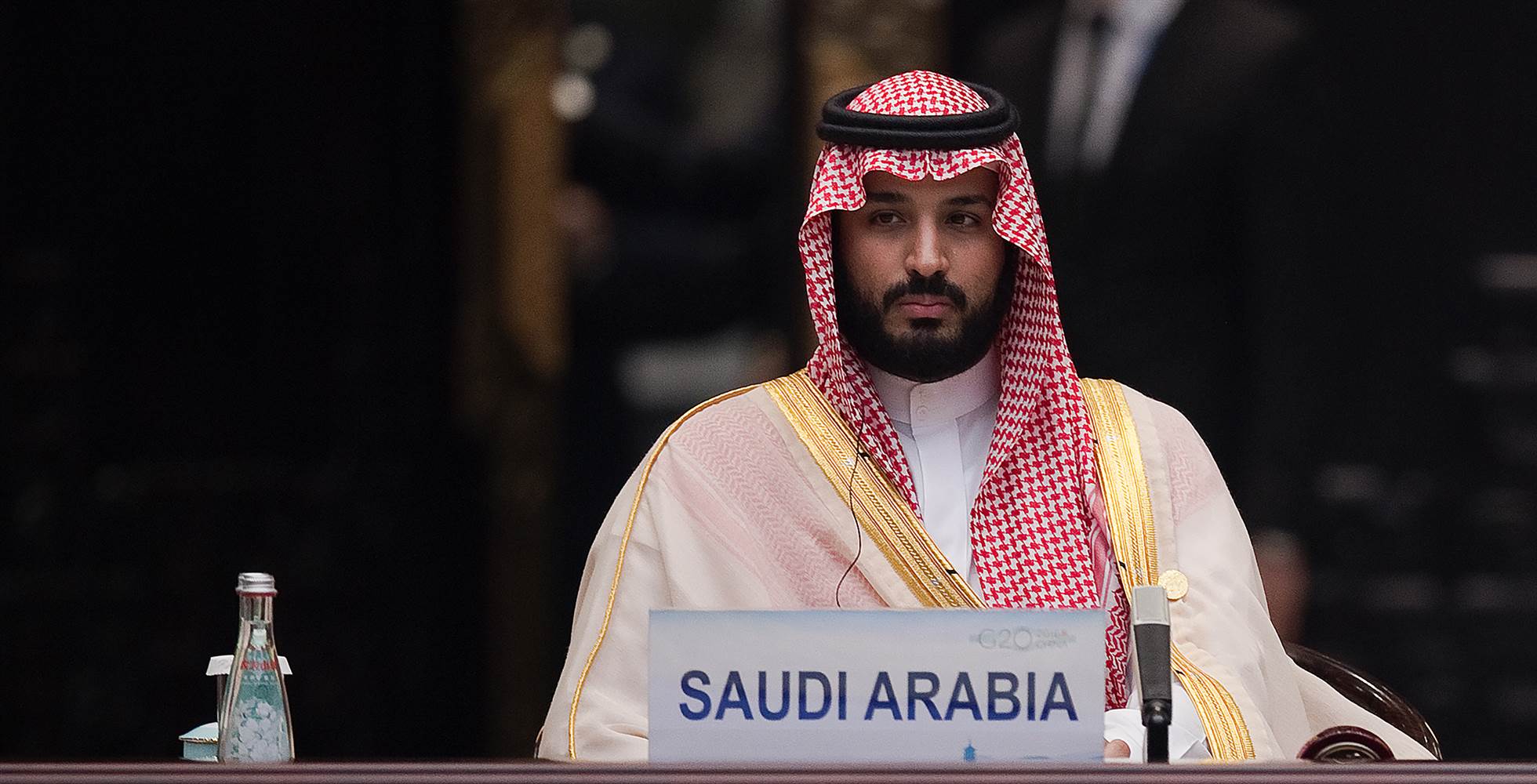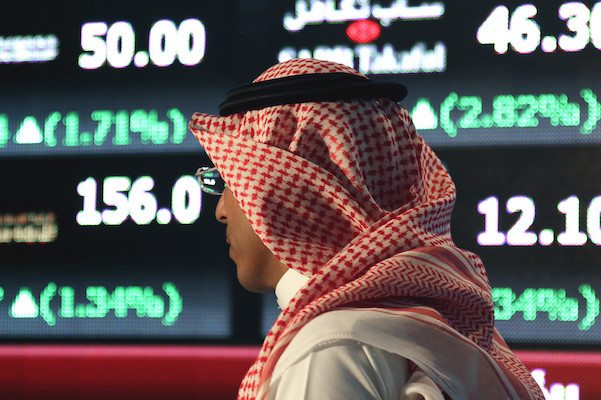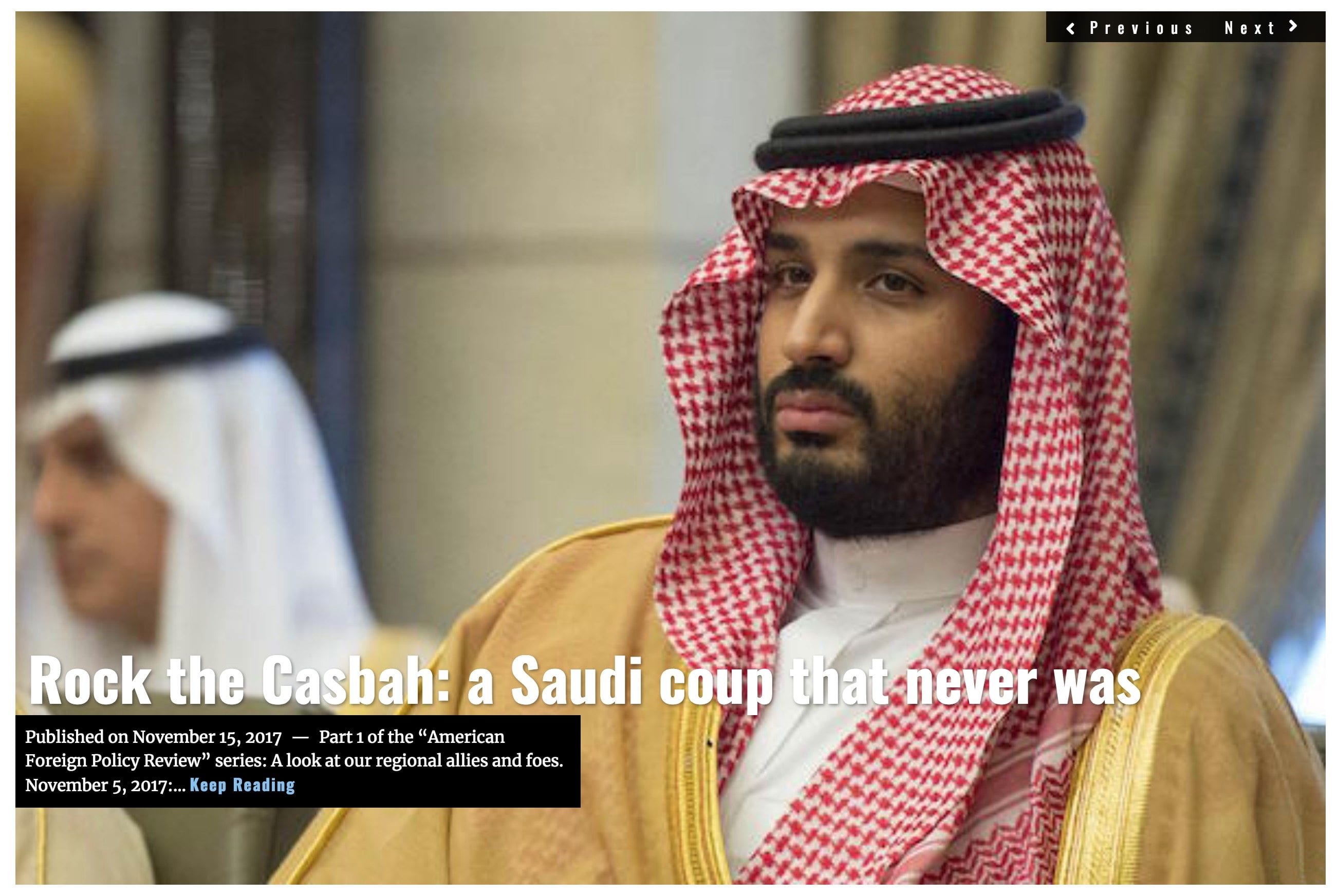A Lima Charlie News Business Report: This month’s purge of dozens of influential Saudis in so-called “anti-corruption” arrests has many questioning whether Saudi Arabia’s newest Crown Prince, 32-year-old Mohammed bin Salman, is gambling with his country’s economic and political future in more ways than one.
Since the night of November 4th, when armed men from the Saudi Special Forces and Intelligence Directorate arrested over 200 people in what has been deemed a “preemptive coup,” foreign investors have taken notice. With the arrest of 10 royal princes, including the richest man in the Middle East, Prince Alwaleed bin Talal, the instability and risks associated with such extreme actions has now placed the flow of foreign investment into Saudi Arabia in jeopardy. As a result, the Kingdom of Saudi Arabia is now making a concerted effort to calm investors and assure the world that the country is stable and remains ideal for financiers to invest in.

[T]he government is simply cleaning house. It has no impact on foreign direct investment.
– Khalid al Falih, Minister of Energy, Industry & Mineral Resources, Saudi Arabia
On November 16, 2017, in Bonn, Germany, Saudi Arabia’s Minister of Energy, Industry and Mineral Resources, Khalid al Falih, issued a statement at a UN climate conference, reassuring financiers that, “Everybody understands that this is a limited, domestic affair; that the government is simply cleaning house. It has no impact on foreign direct investment. It has no impact whatsoever on the kingdom’s openness, capital flows, and our wide open investment environment.”
Whether investors, despite assurances, will demand higher returns for higher risks remains to be seen.
Power-plays among the elite in the Kingdom are nothing new. Yet, the intensity, speed, and methods used by Crown Prince Mohammed bin Salman are far more dramatic than in previous iterations. These moves could place Saudi Arabia in an, especially disadvantageous position with investors.
Anti-Corruption Probe: is the crackdown real?
Many view the Saudi anti-corruption probe as real, necessary, and overdue, with the coexisting benefit of eliminating the Crown Prince’s enemies. For too long, many have viewed the Kingdom as a den of corruption, with only a select and elite few benefiting from the profits generated by oil revenue. Yet, how does the Crown Prince directly benefit from his most recent actions?
Unconfirmed reports state that the Crown Prince’s father, King Salman bin Abdulaziz, at 81, suffers from increasing dementia. Besides neutralizing his enemies, Crown Prince Salman has also successfully isolated his father with the anti-corruption campaign, and most likely assured his immediate place in the line of succession for the throne.
Many questions have arisen. Will the Crown Prince force his father to abdicate sooner than later? Are the Crown Prince’s actions simply the result of ruthless ambition or necessary tactics and strategies to attain goals essential to preserve the Kingdom?
![Image [Saudi Arabia’s stock market Tadawul]](https://limacharlienews.com/wp-content/uploads/2017/11/Saudi-Stock-Exchange-Tadawul-Nomu.jpg)
By broadening its economy into a post-oil-dependent one, Saudi Arabia can remain an influential player on the world stage well into the future. As members of Saudi Arabia’s younger population transition from university to the workforce, fewer opportunities outside of the oil industry exist. This raised the risk of flight of an educated workforce seeking employment outside of the Kingdom. The issue, one that the Crown Prince resolved to address, was challenged by a corrupt old-guard, staunchly against such reforms.
Gauging Foreign Investment Risks
In the Middle East-North Africa (MENA) region, the “Arab Spring” movements caused a major downflow of direct foreign investments into the entire region. Many economies collapsed showing little sign of recovering in the absence of a stable government (or any government at all), such as in Libya. As conflicts continue to rage, smuggling and the inflated prices of black markets reign as the main routes for trade. Political upheaval is bad for any country’s business.
“Country risk” is an assessment used by investors to identify and predict risks vs. returns. There are two general categories used: economic and political risks. Economic risk assesses the debt-to-GDP ratio, along with other economic factors that hint at the country’s ability to repay its debts. Political risks assess the decisions made by politicians that can affect the structure of government and therefore the very safety of investments in a country.
A combination of techniques developed by investors are “beta-coefficients” and “sovereign ratings.” These are further distilled by qualitative and quantitative analysis. The quantitative analysis assesses “hard” objective risk factors, while qualitative analysis uses “soft” subjective material, like changing political events and best predictions on “what may happen next.” The MSCI table is an ongoing resource used by investors that catalogues risk metrics for different countries. The results are then combined to assign a credit rating to any given country.
#ملخص_السوق_المالية لهذا اليوم الخميس 23 نوفمبر 2017 #تداول pic.twitter.com/8yNbYIk4XL
— Saudi Exchange | تداول السعودية (@tadawul) November 23, 2017
There are thousands of sub-variables within these categories that are indicators to investors of possible changes and greater risks. For example, even the slightest pronouncement within a politician’s speech can change the course of investor strategy at any given moment.
A massive and sudden upheaval, like the one currently ongoing in Saudi Arabia, can create a huge impact on how investors may respond. Besides the risk of his internal enemies’ retaliation, the Crown Prince’s strategy and tactics also create an additional huge risk for Saudi Arabia as a whole, as foreign investors may demand higher returns or even pull out of KSA investments altogether. This threatens to weaken Crown Prince Salman’s position and, if so, his enemies merely need to sit back and watch foreign investors do the job of removing him from power, without his enemies having to lift a finger.
The sooner the Crown Prince can prove, to investor comfort, that he has stabilized the Kingdom, the less likely there will be a downturn or freeze on those investments.
Brian Jones and John Sjoholm, Lima Charlie News
[Edited by Anthony A. LoPresti]
Brian Jones is a co-founder of the consulting organization Erudite Group, entrepreneur, writer, tactical and wilderness skills instructor, and personal security consultant who has worked in many regions of the world. He has trained and worked with many agencies, including the Boston, Massachusetts Police Department, and the US Army Mountain Warfare School. He currently heads a small boutique security firm that consults for select celebrity and executive clients.
John Sjoholm is Lima Charlie’s Middle East Bureau Chief and founder of the consulting organization Erudite Group. He is a seasoned Middle East connoisseur, with a past in the Swedish Army’s Special Forces branch and the Security Contracting industry. He studied religion and languages in Sana’a, Yemen, and Cairo, Egypt. He lived and operated extensively in the Middle East between 2005-2012 as part of regional stabilizing projects, and currently resides in Jordan. Follow John on Twitter @JohnSjoholmLC
Lima Charlie provides global news, insight & analysis by military veterans and service members Worldwide.
For up-to-date news, please follow us on twitter at @LimaCharlieNews
In case you missed it:



![Image The Arabs - a "Manufactured" People? [Lima Charlie News]](https://limacharlienews.com/wp-content/uploads/2018/12/Arabs-A-Manufactured-People-Lima-Charlie-News-480x384.png)
![Image Drop in oil prices may trigger unintended consequences [Lima Charlie News]](https://limacharlienews.com/wp-content/uploads/2018/11/main_900-480x384.jpg)
![Image The Right Response to the Death of Jamal Khashoggi [Lima Charlie News]](https://limacharlienews.com/wp-content/uploads/2018/10/The-Right-Response-to-the-Death-of-Jamal-Khashoggi-Lima-Charlie-News-480x384.png)

![Africa’s Elections | In Malawi, food, land, corruption dominate [Lima Charlie News]](https://limacharlienews.com/wp-content/uploads/2019/06/Malawi-election-Food-land-corruption-480x384.jpg)
![Syria’s oil, gas and water - the Immiscible Solution to the War in Syria [Lima Charlie News][Photo: ANDREE KAISER / MCT]](https://limacharlienews.com/wp-content/uploads/2019/05/Syria’s-oil-gas-and-water-480x384.png)
![Image The Rwandan Jewel - Peacekeepers, Conflict Minerals and Lots of Foreign Aid [Lima Charlie World]](https://limacharlienews.com/wp-content/uploads/2019/03/Rwanda-Jewel-480x384.jpg)
![Image Russia's energy divides Europe [Lima Charlie News]](https://limacharlienews.com/wp-content/uploads/2019/03/Russias-energy-divides-Europe-Lima-Charlie-News-480x384.png)
![Image The Arabs - a "Manufactured" People? [Lima Charlie News]](https://limacharlienews.com/wp-content/uploads/2018/12/Arabs-A-Manufactured-People-Lima-Charlie-News-150x100.png)
![Image Drop in oil prices may trigger unintended consequences [Lima Charlie News]](https://limacharlienews.com/wp-content/uploads/2018/11/main_900-150x100.jpg)